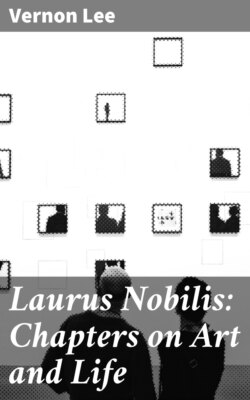Читать книгу Laurus Nobilis: Chapters on Art and Life - Vernon Lee - Страница 32
На сайте Литреса книга снята с продажи.
IX.
ОглавлениеI have said that our pleasure in the beautiful is essentially a spiritual phenomenon, one, I mean, which deals with our own perceptions and emotions, altering the contents of our mind, while leaving the beautiful object itself intact and unaltered. This being the case, it is easy to understand that our æsthetic pleasure will be complete and extensive in proportion to the amount of activity of our soul; for, remember, all pleasure is proportionate to activity, and, as I said in my first chapter, great beauty does not merely take us, but we must give ourselves to it. Hence, an increase in the capacity for æsthetic pleasure will mean, cæeteris paribus, an increase in a portion of our spiritual activity, a greater readiness to take small hints, to connect different items, to reject the lesser good for the greater. Moreover, a great, perhaps the greater, part of our æsthetic pleasure is due, as I also told you before, to the storing of impressions in our mind, and to the combining of them there with other impressions. Indeed, it is for this reason that I have made no difference, save in intensity between æsthetic creation, so called, and æsthetic appreciation; telling you, on the contrary, that the artistic layman creates, produces something new and personal, only in a less degree than the professed artist.
For the æsthetic life does not consist merely in the perception of the beautiful object, not merely in the emotion of that spiritual contact between the beautiful product of art or of nature and the soul of the appreciator: it is continued in the emotions and images and thoughts which are awakened by that perception; and the æsthetic life is life, is something continuous and organic, just because new forms, however obscure and evanescent, are continually born, in their turn continually to give birth, of that marriage between the beautiful thing outside and the beautiful soul within.
Hence, full æsthetic life means the creating and extending of ever new harmonies in the mind of the layman, the unconscious artist who merely enjoys, as a result of the creating and extending of new harmonies in the work of the professed artist who consciously creates. This being the case, the true æsthete is for ever seeking to reduce his impressions and thoughts to harmony; and is for ever, accordingly, being pleased with some of them, and disgusted with others.
